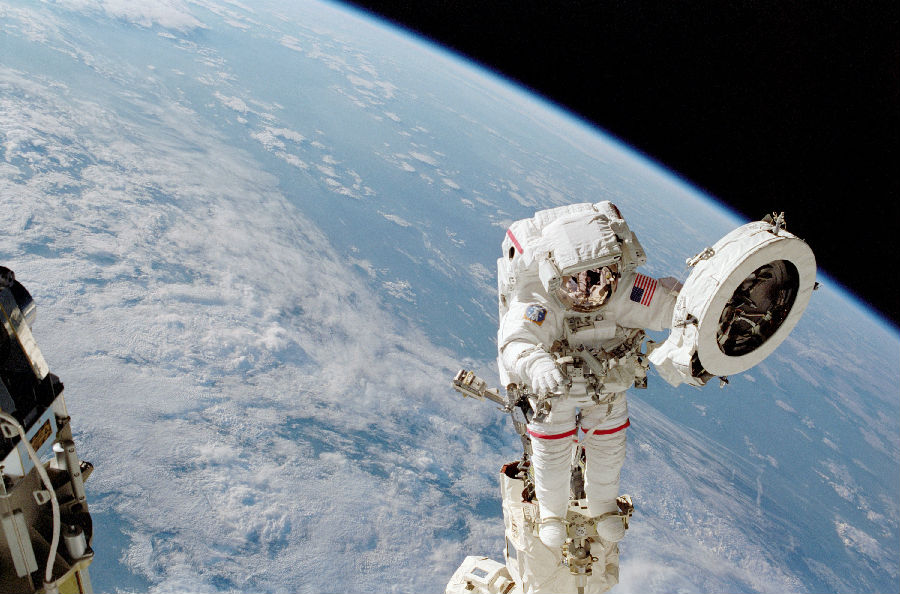From planetary orbit, the earth and heavens look serene. But the vacuum of space is a hostile environment, lacking oxygen and permeated by radiation. Since the advent of manned space flight in the 1960s, humankind has been exploring this inhospitable realm from the relative safety of spacecraft. But occasional extravehicular activities have led astronauts to leave these confines and explore the unknown. In order for astronauts to survive in space, spacesuits provide a self-contained environment. Their tough material, along with heating and cooling elements, protect astronauts from extreme temperatures, ranging from around 250 degrees Fahrenheit to minus 250 degrees. The suits are pressurized with pure oxygen, allowing astronauts to breathe and keep their blood from boiling in the vacuum of space.
从行星轨道上看,地面和天空看起来都是一片宁静。但宇宙是真空的,不适合人类生存,因为缺乏氧气,而且到处都有辐射。自从上世纪60年代出现载人太空飞行以来,人类一直在从相对安全的宇宙飞船中探索宇宙这个荒芜之地。但有时候,舱外活动时,宇航员也可以走出桎梏,探索未知。为了让宇航员在太空中生活下来,就要依靠太空服来提供独立的环境。太空服材质坚固,自带加热和冷却功能,可以保护宇航员不受极端温度的伤害,这里说的极端温度是指250华氏度-零下250华氏度。太空服里密封了纯氧气,这样宇航员既可以呼吸,又可以在真空的太空环境中免于血液烧腾。

The first venture outside the spacecraft was made by Soviet cosmonaut Alexey Leonov in 1965, lasting only 12 minutes. This feat was duplicated a few months later by American astronaut Edward White during the Gemini 4 mission. Although these excursions were meant to test the feasibility of humans to exist outside the spacecrafts, spacewalks have become a relatively common part of missions in the space shuttle era. On spacewalks, astronauts have performed vital tasks that could not be accomplished from inside the shuttle. They've been able to recover lost satellites, restoring them to their proper orbit. They have serviced orbiting bodies, like replacing the solar panels on the Hubble Space Telescope. And they have become the construction crew for the International Space Station.
第一次进行舱外探索的人是苏联宇航员阿列克谢·列昂诺夫,那时候是1965年,他的舱外探索仅持续了12分钟。数月后,美国宇航员爱德华·怀特在执行双子座4号任务期间也进行了舱外探索。虽然舱外的短途活动只是为了测验人类是否能在宇宙飞船外活动,但太空漫步已经成为航天飞机时代一个相对常见的任务之一。正是通过太空漫步,宇航员才得以执行一些关键性任务,而这些任务是在舱内做不到的,比如保养环绕轨道飞行的卫星,替换哈勃望远镜上的太阳电池板。宇航员已俨然成为国际空间站的施工人员。
Conducting spacewalks is dangerous, and astronauts work in pairs, tethered to the spacecraft for safety. Walking in these spacesuits is not as easy as it seems. The thick pressurized gloves make grasping tools difficult, while the weightlessness of space creates its own issues. To ensure spacewalk missions are successful, astronauts practise their planned excursions at NASA’s Neutral Buoyancy Laboratory. Immersed in a tank of water, the astronauts neither sink nor float, creating a sensation close to weightlessness. For every hour a task is scheduled on a mission, up to 10 hours is spent practicing underwater.
太空漫步很危险,所以宇航员会组队进行,就算这样也要通过绳索与宇宙飞船相连,以保证安全。穿着太空服漫步并不像看起来那样简单。由于太空服厚厚的手套经过了密封,所以拿工具就成了一件难事,而且太空里是失重的,所以还引发一些困难。为了确保舱外任务顺利进行,宇航员在美国宇航局的无重力实验室进行经过计划筹备的短途活动。宇航员会置身于一缸水里,在其中,他们既不会漂浮也不会下沉,这就营造了一种类似失重的体验。舱外执行任务中的一小时,就意味着台下10小时的水下练习功。
As NASA moves forward on the maintenance and construction of the International Space Station, spacewalks will continue to be vital to the process.
在未来,美国宇航局会继续进行国际空间站的维护和建造,而太空漫步也将在其中发挥关键性作用。












